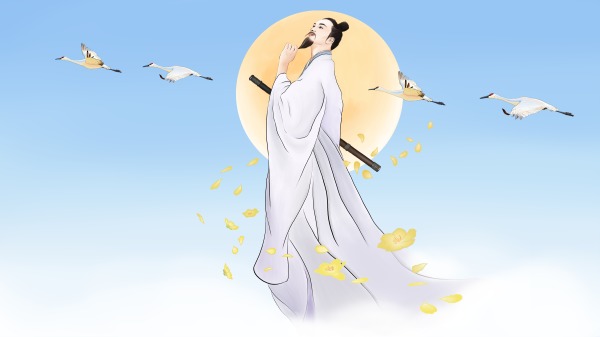
被后人誉为“诗仙”的唐代大诗人李白。(手绘插画:Winnie Wang/看中国)
日本学者、翻译家小畑薰良(Shigeyoshi Obata,1888-1971),明治二十一年6月30日生于日本大阪府一户富裕的农家。父亲小畑万治郎通汉学,在小畑薰良学习假名前,就教他《论语》。也许因为家学渊源,受父亲治学熏陶,小畑薰良从小热爱中国古典文学,谙熟李白诗歌。
1906年,他从大阪茨木中学毕业,入早稻田大学预科文科班,随后升入早稻田大学。1907年,小畑薰良从早稻田大学退学,去美国留学。他先后毕业于威斯康辛大学、芝加哥大学。之后在芝加哥大学研究生院攻读中世纪英国文学。
后来他作为日本外务省翻译官,任职纽约日本总领事馆。期间他翻译出版了《李白诗集》。他曾应邀去欧洲,游学一年,1925年回日本。他广泛接触东西方社会、语言、文学,促使他形成海纳百川的心态。
1922年,小畑薰良在纽约出版了他英译的《李白诗集》(The Works of Li Po,the Chinese Poet)。该书共选译李白诗一百二十四首(包括杜甫等有关李白的诗八首)。世界上最早、最全面翻译李白诗歌成英文的就是这位日本人。
全书融翻译与研究、作品和资料为一体,为西方世界提供第一部李白诗集专辑,深受英文读者欢迎,影响深远。
吕叔湘先生评述小畑薰良译笔曰:“以平实胜”,“所谓平实,非一语不增,一字不减之谓也。小畑之译太白诗,常不以貌似,而语气转折,多能曲肖。”
现从英译《李白诗集》中选录八首中英文对照的诗,略加评注。
春日醉起言志
处世若大梦,胡为劳其生?
所以终日醉,颓然卧前楹。
觉来盼庭前,一鸟花间鸣。
借问此何时,春风语流莺。
感之欲叹息,对酒还自倾。
浩歌待明月,曲尽已忘情。
AWAKING FROM SLEEP ON ASPRING DAY
Life is an immense dream,why toil?
All day long Idrowse with wine,
And lie by the post at the front door.
Awakening,I gaze upon the garden trees,
And,hark,a bird is singing among the flowers.
Pray,what season may this be?
Ah,the songster’s amango-bird.
题目中“言志”指诗歌,语出《书.舜典》“诗言志”,省译了。“处世”有live in the world之意,译为life,可也。“处世若大梦”修辞用明喻(simile),而Life is an immense dream.修辞用隐喻(metaphor)。“醉”不用drunken翻译,用drowse with wine,雅得多。此处“流莺”绝非prostitute,译者用mango-bird(一种蜂鸟)译之。
月下独酌
花间一壶酒,独酌无相亲。
举杯邀明月,对影成三人。
月既不解饮,影徒随我身。
暂伴月将影,行乐须及春。
我歌月徘徊,我舞影零乱。
醒时同交欢,醉后各分散。
THREE WITH THE MOON AND HIS SHADOW
With ajar of wine Isit by the flowering trees.
I drink alone,and where are my friends?
Ah,the moon above looks down on me;
I call and lift my cup to his brightness.
And see,there goes my shadow before me.
Hoo!We’re aparty of three,I say,—
Though the poor moon can’t drink,
And my shadow but dances around me,
We’re all friends to-night,
The drinker,the moon and the shadow.
Let our revelry be met for the spring time!
I sing,the wild moon wanders the sky.
I dance,my shadow goes tumbling about.
While we’re awake,let us join in carousal.
Only sweet drunkenness shall ever part us,
Let us pledge afriendship no mortals know,
And often hail each other at evening
Far across the vast and vaporous space!
此处“相亲”并非男方、女方论婚谈嫁初次见面,而是指朋友。“月将影”,即月与影。“无情游”意为忘却世情之交游,英译为a friendship no mortals know(无人知道的友谊)。“云汉”本指银河,此处借指仙境,英译成the vast and vaporous space。
访戴天山道士不遇
犬吠水声中,桃花带露浓。
树深时见绿,溪午不闻钟。
野竹分青霭,飞泉挂碧峰。
无人知所去,愁倚两三松。
ON GOING TO VISIT ATAOIST RECLUSE ON MOUNT TAI-TIEN,BUT FALLING TO MEET HIM
A dog barks afar where the waters croon.
The peach flowers are deeper-tinted,wet with rain.
The wood is so thick that one espies adeer at times.
But cannot hear the noon bell in this lonely glen.
The wild bamboos sway in the blue mist,
And on the green mountainside flying cascades glisten.
What way has he gone?There is none to tell;
Sadly Ilean against apine tree here and there.
本篇写于唐开元六、七年(718-719),李白十八、九岁时。当时他隐居在戴天山(又名大康山或大匡山,在四川昌隆县北五十里。)大明寺内读书。“桃花带露浓”,一为桃花增色,二点出入山时间为早晨,与“溪午不闻钟”在时间上相映照,言正午时来到溪边,却不闻钟声,暗指道士未归。“青霭”,青色的云气。全诗翻译明白平实,有身临道士生活的世外桃源之感。
(未完待续)
